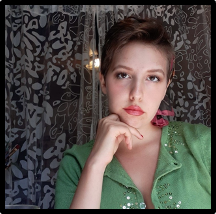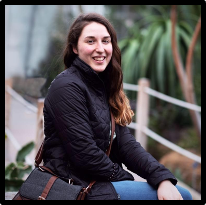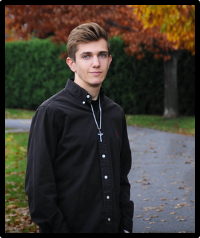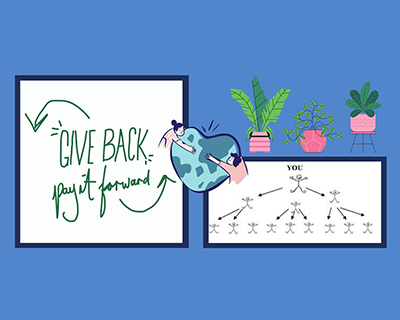Student-led workshop on Sustainable Happiness a first at Ped Days
Four final-year students in the Community, Recreation and Leadership Training (CRLT) Program presented a workshop to teachers at Ped Days Jan. 20 with the goal of bringing Sustainable Happiness into the virtual classrooms of Dawson College. It was the first time that students have been presenters at the annual professional development event for Dawson teachers.
The idea of students sharing Sustainable Happiness concepts with teachers originated with Myka Taylor, a teacher in the CRLT Program. In 2014, Myka was one of the first people to take the Sustainable Happiness (SH) Course and last year, she became one of the first Certified Sustainable Happiness Facilitators through a series of certificates offered by Dawson’s Sustainability Office.
Sustainable Happiness part of CRLT course
“Last semester, I decided to offer sustainability and SH as an option of choice in a CRLT third-year Public Relations Course,” Myka said. “The students excelled in their workshops and created an awareness of why SH is important, not only in the classroom but in our personal lives as well. Some Dawson employees in Human Resources attended the event, and they thought it would be a great workshop for faculty.”
In the CRLT course, Jennifer de Vera of the Sustainability Office and Myka shared many resources about how Nature and happiness are intertwined. They explained that “to achieve a positive feeling that sustains, we must first acknowledge the importance of Nature as our mentor and how well-being for all means well-being for ourselves,” said Matteo Zappone, one of the students.
Well-being a challenge for everyone
Well-being is a challenge for many people as we live through the pandemic. “Being online is difficult,” said student Ethan Belley. “Creating an online environment that engages is easier said than done.”
Fellow student Anissah Vanhorn said that she hoped faculty members would “take the learning and apply it in your teaching environment.”
The four students covered what Sustainable Happiness means and gave lots of practical tips to incorporate it into our daily lives and into the classroom, whether it is virtual or in person.
Anissah said that sustainable happiness is “purposeful happiness” and that “we already have it when we talk about gratitude.”
Happiness comes when you know life is good
Matteo said: “that happiness is that feeling that comes over you when you know that life is good. You can’t help but smile when a baby laughs, when you see an animal or smell fresh baked desserts.”
Another student, Noémie Gravel, said that “sharing happiness spreads happiness” and she warned about focusing on “the goods life,” which is focused on consuming and promoted by advertising, instead of “the good life,” which is focused on true happiness.
Another way of putting it is that Sustainable Happiness consists of well-being for yourself, well-being for others and well-being for the environment.
Students offered tips to bring Sustainable Happiness into our lives, classrooms, families and workplaces:
- Beginning a meeting or conversation with good news or sharing a reason to be grateful
- Making plants part of your environment for a calming effect
- Using natural light
- Thinking about things that make us happy
- Sharing with others and doing good deeds
- Doing meditation or taking time for the spiritual life
- Watching a time lapse video of a blooming flower
- Exercising to give yourself energy for the day
- Reconnecting with Nature as often as we can
- Moving our activities outside when we can (like teaching outdoors)
- Taking time for play
- Keeping a gratitude journal
An SH mindset can help teachers and students
Teacher Myka believes “Sustainable Happiness can be the perfect new mindset to help students, educators or anyone interested. We need to see the importance and power of incorporating themes such as sustainability, wellbeing, and innovations in our classroom, to help mold more sustainable, healthy, and creative individuals.”
Student Matteo says that teachers can use Sustainable Happiness to help students make it through this period: “If this concept spreads, like I think it could, it could make a major impact in people’s lives. For students online, it can offer a new perspective on the pandemic and a chance for growth, self-reflection, and gratitude. This, in my opinion, is lacking and needs to be reinforced as much as possible from educators in our classrooms.
“Teachers are my source of hope because they are the ones who can choose to use positive rhetoric in their classrooms and repeat that message of conserving happiness and not letting it drift away from one moment to the next. Using their skills in public speaking and persuasion, I believe it is with their help that we can turn Sustainable Happiness into the new norm and a staple in our everyday classrooms.”

Anissah Vanhorn : 3rd year, Community, Recreation and Leadership Training

Matteo Zappone : 3rd year, Community, Recreation and Leadership Training

Noémie Gravel : 3rd year, Community, Recreation and Leadership Training

Ethan Belley : 3rd year, Community, Recreation and Leadership Training
What did the students get out of Sustainable Happiness?
Matteo: “The fundamental quote that I’m neither worse nor better than anyone else has allowed me to respect and appreciate everyone and everything around me. I’m able to feel more compassion for others and with that I can be kinder to myself. As a student, being patient and continuing to see the glass half full has allowed me to stay motivated and resilient during a time like this.”
Noémie : “I have adopted sustainable happiness by taking the time to do sports, enjoying Nature as much as possible, taking the time to take care of others and thinking of what I consume daily to limit my harm to the environment.”
Ethan: “I’ve started thinking of things differently. When in a difficult situation, rather than complaining, I think of it as a lesson for me to grow individually. I’ve decided to spend at least a few minutes outdoors to breathe in fresh air and to meditate on the things I’m thankful for.”
Anissah: “Personally, I have been practicing Sustainable Happiness through taking care of myself and the environment. As a student, I ensure that I am creating space in my agenda to care for myself. Giving myself time to prep meals, go grocery shopping, to fix my bike, ensure that I am not ordering take out or taking an Uber because I didn’t plan my time right.”



